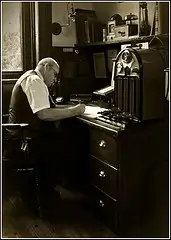Connect lessons learnt through tagging
Yesterday, I read a blog post about "How do you convince people to share failures?" and I also heard about an interesting lessons learnt website project which was implemented some years ago.
In that project station masters were asked to give regular information about their stations such as statistics. Secondly to list problems and challenges throughout the last years. They were asked to describe how they tackled the problems. What were the failures and the success? This information combined with some criteria were filled to a database. With that every station master could find colleagues with similar problems and could contact them.
 To me, it seems like a simply mechanism with a great result. A knowledge sharing tool which concentrates on learning experiences and connects people and knowledge.
But how would you do this nowadays in the realm of web2.0? Two questions came up to my mind:
To me, it seems like a simply mechanism with a great result. A knowledge sharing tool which concentrates on learning experiences and connects people and knowledge.
But how would you do this nowadays in the realm of web2.0? Two questions came up to my mind:
- Does web2.0 really help us exchange lessons learnt in such an effective manner?
- Can tagging be the right way to find each others lesson learnt easier?
Web2.0 and lesson learnt I have my doubts whether web2.0 goes this far yet to connect the right people with same problems in such an effective way. Social network tools give you features such as recommendations, feedbacks and a whole range of perspectives. But is that all you are looking for in that moment? In the best case, you can have a community of practice where you can address your questions. Valuable experiences are still hidden behind numerous links, which I can identify easier with social bookmarking, but still have to hope that Google will deliver me good results.
Tagging In my opinion tagging is very powerful, but often underestimated, because it gives us relevance. Look at a tag-cloud and imagine you can click through endless relevant sub-tag-clouds. You can navigate through an ocean of wisdom, connecting knowledge and the people behind it. Imagine tagging is used wider than to just give broader information (e.g. general topic) but includes many much more information such as the "character" of a lesson learnt (success, failure, slow, expensive, high impact etc.). Many people already do that in social bookmarking, though it is very individual.
- Would that mean I can connect experiences the way it was down with a sophisticated application for the station masters? I wonder whether tags for evaluation can work as good as the topic-wise ones.
- How could the word "slow" be separated in a tag cloud from the word "software" so they do not stand next to each other?
- Do I really need this, or do topic clouds bring me anyway quicker to the field of my interest, and comments deliver the evaluation to me?
My aim is to use the power of a network itself to connect to experiences directly. I think that in most cases an application such as the station master is too much of an effort. It needs criteria and complicated programming. Can't this be done easier with web2.0 technology and the wisdom of crowd?